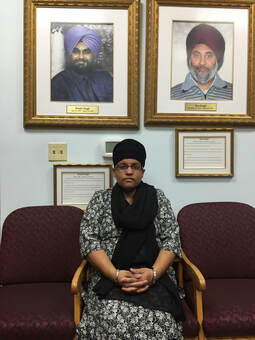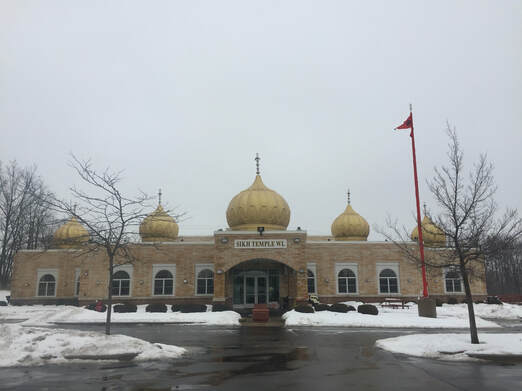 Nirmal Kaur sits below photographs of two Sikh priests killed August 5, 2012. Nirmal Kaur sits below photographs of two Sikh priests killed August 5, 2012. Running late. For most or us, it can mean irritating the more punctual people, or messing up a day’s calendar, or simply triggering feelings of urgency. For some, however, tardiness changed the course of their lives. When it comes to shootings, either random, mass or other types, there is a fine line of fate when it comes to who gets killed or wounded. But even those who are not shot, or do not witness shootings, can be affected. Two families that were late to temple on August 5, 2012, in Oak Creek, Wisconsin, may have avoided death or physical injuries because of being behind schedule. By late morning, six worshipers were dead, including the Sikh temple president and three priests, and four other people were wounded. One of those wounded remains in a nursing home with brain damage more than six years later. Pardeep Kaleka was driving his son and daughter to temple that morning when his 8-year-old daughter announced she had forgotten her Sunday school notebook. He turned the car around and drove home, she ran inside to get the notebook, and they drove back toward the Sikh Temple. Just as he was approaching the highway exit to the temple, however, about a dozen police cars, lights flashing, sped up behind him. He pulled over to let them pass. A former police officer, Kaleka noticed several police jurisdictions were responding. He knew that meant something big was happening. Nirmal Kaur and her family were also behind schedule — due to her own actions. She and her husband, with three small children in tow, reached the temple after the shots rang out. When they arrived “I remember there was all [these] cops blocking all the area,” she said. “If we were not running late, if I was not, you know, spending more time on my makeup — my husband was arguing with me ‘Come on, hurry up,’ — we would’ve been inside there,” she said. “I think about that day all the time. If we were in there, I think, I would have got shot. My husband would have got shot. My kids would have got shot.” That morning at the suburban Milwaukee temple, a neo-Nazi into the white power music scene may have mistook the Sikhs for Muslims. He shot as many people as he could before turning the gun on himself. He died at the scene. The first responding police officer was shot 15 times, and survived, though his injuries forced him to retire from police duty. Pardeep Kaleka knew his parents were inside the temple, but he could not get to them. He received a call from his mother, who spoke quietly because the gunman was still in the temple. She was hiding in the kitchen pantry with about a dozen others. She asked him to get help. He also got a call from his father’s phone — but it was a priest telling him his father had been shot, was in serious condition, and needed help. Because of his former ties with law enforcement, Pardeep was able to speak with the officer in charge. He was finally allowed into the command center at a nearby parking lot, leaving his children with friends. He found his mother, who had escaped the temple with others in an armored police vehicle. She was scared and upset, but not wounded. It was several hours before Pardeep and his brother Amardeep found out that their father, Satwant Kaleka, had been shot dead while fighting the gunman. Nirmal Kaur’s family did not stay at the scene when they learned of the shooting. Stories were flying, and nobody knew exactly what was happening inside the temple, other than someone had been shooting. “We didn’t know what to do,” Kaur said, adding that her young children were frightened. Some members of the temple decided to go out to lunch and stay together for support until answers could be found. But Nirmal wanted to protect her young children from hearing too much. “I told my husband, ‘Let’s get out of here.’ Because the kids were crying. They were getting scared. I said, ‘Let’s take the kids out of here. I don’t want to get them traumatized from this.’” The family drove across town to another Sikh temple in Brookfield, Wisconsin, about 25 miles away. She said people there wanted to hear about what had happened, but she and her husband knew few details. She made sure her children had something to eat after the service, though she and her husband had little appetite. “It was a really sad day,” she said. Since then, many members of the temple have found new directions for their lives. Pardeep Kaleka enrolled in graduate school to become a counselor. He specializes in holistic trauma-informed treatment with survivors of assault, abuse and acts of violence. In his men’s counseling groups, he often addresses male toxicity and anger. He also co-founded the group Serve 2 Unite, which engages youth and communities to create peaceful communities and address violence and trauma. He and former skinhead Arno Michaelis met after the Sikh temple shooting, and they wrote the book, “The Gift of Our Wounds,” about the transformational power of friendship and forgiveness. Kaleka also became a more conscious family man. “I found a new appreciation about fatherhood, and being a husband. And so I started to hug my kids a little bit longer,” he said. “Make love differently — that sounds weird.” Kaleka laughed. “And just generically not taking things for granted. I think a lot of us do that, you know. Because we think we’re going to live ’til tomorrow. And this really showed me that nothing is promised.” Even though Nirmal Kaur had no immediate family members killed that day, the deadly incident that impacted the entire Sikh community pushed her to her re-examine her life and religion. “Since 2012, a lot of changing. I got more involved in my community. I used to stay away. I didn’t care much. Me and my husband got baptized after, in 2015,” said Kaur, who is now the temple community liaison, public educator and greeter. “And then I said to myself, ‘Now I want to do something. I want to educate people.’ It really needs to be done, and we need to do something to show people who we are.” Both Nirmal Kaur and Pardeep Kaleka feel partly responsible for many non-Sikhs in Milwaukee and beyond not knowing enough about Sikhism. She believes if the gunman had known more about them and their religion, he may have left them alone. A chilling fact: The murderer visited the temple a few days before the shooting, and learned the building’s layout for his killing spree. “He took the tour of the temple,” she said, adding that she did not meet him. “All we need to do is talk to them. And sometimes I wish that the shooter came in here, instead of having doubt about who we are, should have talked to us, asked questions. Who you guys are? What are you guys? What do you believe in? What do you guys do for prayer? Nothing. Anybody would answer those questions.” Pardeep Kaleka still mourns his father’s death, yet most days finds himself full of hope. He tries to make the most of every day he is alive — thanks to a forgotten notebook. “We believe in Chardi Kala,” he said of a basic Sikh tenet. That means relentless optimism.
2 Comments
Roberta Motter
3/15/2019 10:17:19 pm
Oh Mary I’m feeling the ripple
Reply
3/18/2019 01:11:57 pm
Thanks, Roberta.
Reply
Leave a Reply. |
AuthorMary Tolan is a fiction writer and journalist. Her first published book Mars Hill Murder, a mystery set in Flagstaff, will be published by The Wild Rose Press in autumn of 2023. Archives
May 2023
Categories |

 RSS Feed
RSS Feed